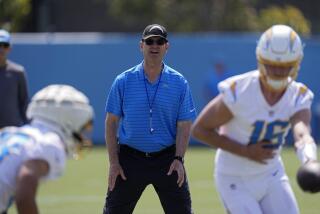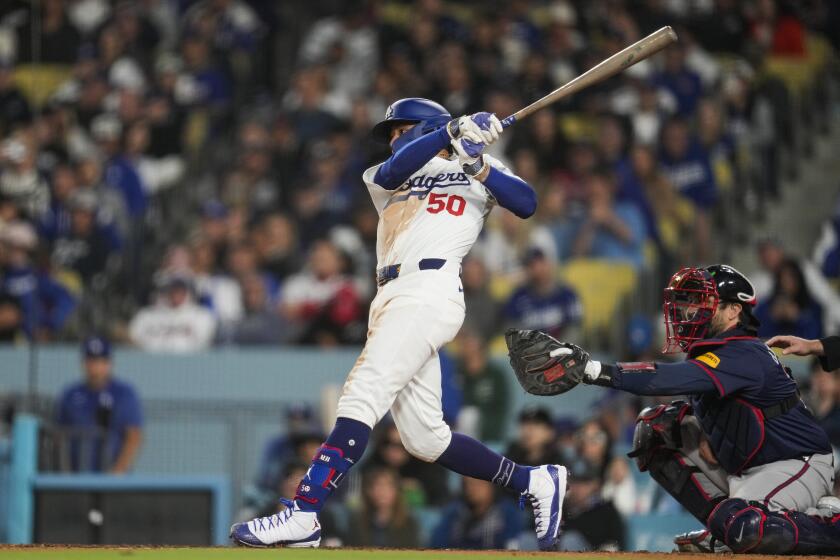Volleyball Draws Dollar Sign in the Sand : Sports: Pro tour has grown into a big business, but some cities don’t like the idea of an admission charge for an event held on a public beach.
Beach volleyball was once pure weekend recreation, a way to work up a sweat on a sunny Southern California afternoon. There were competitions in those early days, but the prizes were six-packs and bragging rights, not giant bundles of cash.
Today, beach volleyball is equal parts professional sport and big business--complete with corporate sponsors, prize money in the millions of dollars and national television exposure.
The tour stops not only in such venerable volleyball haunts as Hermosa Beach and Manhattan Beach, but also in Ft. Worth and Phoenix. This year, standout Randy Stoklos may become the first player in the tour’s history to surpass the $1-million mark in career earnings.
Citing such developments, tournament organizers say it is time to bring in another of the trappings of big-time athletics--paid admission.
Most cities on the tour, including Seal Beach, have already endorsed the idea of charging for courtside seats. Hermosa Beach and Manhattan Beach, however, are undecided and will hold public hearings on the idea next week. Meanwhile, San Diego is negotiating with the volleyball association to split the ticket revenues and Honolulu has already flatly rejected the idea.
The Assn. of Volleyball Professionals says charging for courtside beach chairs would legitimize the sport and help control the increasingly large crowds, which have grown to thousands of fans in each of the two dozen cities on the tour. But the ticket plan isn’t setting well with some local beach denizens who remember beach volleyball’s humble roots.
“They’ve forgotten their heart and soul,” Manhattan Beach Mayor Bob Holmes said. “These guys see other athletes making millions and they want to do the same thing.”
Organizers experimented last year with admission fees during tournaments in Fresno, where special VIP seats were sold, and in Daytona Beach, where all spectators had to pay admission. But in 1992 organizers are seeking approval from all 24 cities on the tour to start charging fees for up to 2,000 VIP seats around center court.
Tickets would range from $5 to $20 depending on the seat and importance of the tournament. Sitting in the bleachers would still be free.
“We’ve come from a sport that was four guys throwing a ball around to a point where we’re on national television,” said tour director Matt Gage. “We want the prestige and esteem that comes with being a professional sport. We think tickets would help do that.”
Gage said the current free-for-all seating system encourages die-hard fans who want good seats to sleep on the sand the night before big matches and mark out prime spaces with towels. Some enthusiasts have even hauled old sofas to courtside, he said.
That party atmosphere no longer mixes with the professionalism of the tour, which has a record $2.8-million purse this year and will be broadcast nationally on NBC, Prime Ticket and ESPN, organizers say.
Reaction to the ticket plan has been mixed among officials in Manhattan Beach, which will hold the Manhattan Beach Open tournament July 3-5. Although Mayor Holmes vehemently objects to the concept, other officials say it might be the solution to crowd control problems at the event.
Ed Montan, assistant director of parks and recreation in Manhattan Beach, said fans have been known to build three-foot-high mounds in the sand to get a better view, causing disputes among spectators. Tickets would eliminate such conflicts and, because of a unique agreement that makes the city an equal partner in the event, would bring the city half of whatever revenue is generated, he said.
Manhattan Beach’s Parks and Recreation Commission will hold a public hearing on the issue Monday night in City Hall, and the City Council could make a final decision on the matter by the end of the month.
In Hermosa Beach, parks and recreation commissioners have already voted against the plan, saying it is inappropriate to charge for events on the public beach. The council will take up the issue Tuesday night.
“The beach is free and people have never been charged for going to the tournaments before,” said parks commissioner Dani Peirce, a Hermosa Beach resident. “Volleyball is such a free sport. Anybody can play it on the beach. It should stay that way.”
Jon Stevenson, president of the players association and a member of the tour since 1978, said he fondly recalls the early days of the sport but realizes that beach volleyball has changed irreversibly.
“The history has been to have it be a free event, so there is a natural aversion to charging,” he said. “But things have changed. You can’t turn the clock back. It’s a professional sport now, not just a subcult phenomenon.”
More to Read
Get our high school sports newsletter
Prep Rally is devoted to the SoCal high school sports experience, bringing you scores, stories and a behind-the-scenes look at what makes prep sports so popular.
You may occasionally receive promotional content from the Los Angeles Times.






